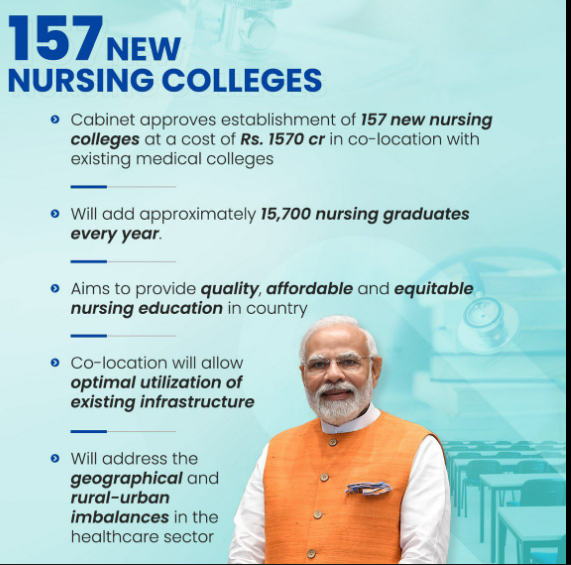157 new nursing colleges to be built in under-served regions: Union Cabinet
The development of 157 nursing colleges alongside medical institutions at a cost of INR 1,570 crore has received clearance from the Union Cabinet. The colleges will be built in underserved regions, guaranteeing that nursing education in the nation is of high quality, accessible, and equitable. Each nursing institution will offer around 100 B.Sc. (Nursing) seats each year, resulting in an annual increase of 15,700 seats for nursing graduates. The construction of these nursing colleges intends to resolve the regional and rural-urban disparities in the healthcare sector, which have harmed healthcare services in underserved areas and led to a lopsided availability of nursing professionals. This program will significantly increase the pool of skilled workers available in the healthcare industry and provide greater job prospects for Indians.
Mansukh Mandaviya: The Union Cabinet has approved the establishment of 157 government nursing colleges.
According to Union Health Minister Mansukh Mandaviya, the creation of 157 nursing colleges at a cost of INR 1,570 crore in co-location with the medical colleges established across the nation since 2014 has been approved by the Union Cabinet. The construction of these nursing colleges intends to resolve the regional and rural-urban disparities in the healthcare sector, which have harmed healthcare services in underserved areas and led to a lopsided availability of nursing professionals.
The constantly evolving healthcare requirements of the nation have made it difficult for the Indian nursing education system to keep up. The main obstacles in this regard have been the insufficient availability of skilled nursing staff and the uneven distribution of health services. The government has been working on several efforts, such as opening new nursing schools nationwide, to address this problem.
The significance of 157 nursing colleges receiving approval
focuses on spatial inequalities and the rural-urban divide in the healthcare industry.
In particular, in underserved districts, states, and Union territories, the construction of these nursing institutions will offer high-quality, equitable, and inexpensive nursing education across the nation. With this action, the geographical and rural-urban disparities in the healthcare industry are intended to be addressed. These imbalances have influenced the availability of nursing personnel and the quality of healthcare services in underserved areas.
An increase in the number of skilled workers available in the healthcare industry
The opening of these nursing schools will significantly increase the pool of qualified workers available to the healthcare industry. Every year, each nursing institution will offer about 100 B.Sc. (Nursing) seats, resulting in an annual increase of 15,700 nursing graduate seats. The action intends to close the gap between the country’s supply and demand for nursing experts.
Better prospects for Indian nurses to find work around the world
Indian nurses are respected throughout the world for their knowledge and skill in the nursing profession. This program will increase the number of nursing professionals in the nation and open up more options for Indian nurses to work abroad. Additionally, it will assist in bringing Indian nursing education up to pace with international norms, giving Indian nurses better mobility and employment prospects.
Details of the Colleges
A total of 157 nursing colleges will be built in accordance with the authorization. Every college will provide about 100 B.Sc. (Nursing) seats annually. Out of these, there will be 27 colleges built in Uttar Pradesh, 23 in Rajasthan, 14 in Madhya Pradesh, 11 in Tamil Nadu and West Bengal, 8 in Bihar, 7 in Jammu and Kashmir, 5 in Assam, Chhattisgarh, Gujarat, and Jharkhand, 4 in Uttarakhand, 3 in Punjab, and 1 in Haryana.
In Uttar Pradesh, nursing colleges will be set up in districts such as Basti, Faizabad, Firozabad, Shahjahanpur, Bahraich, Etah, Hardoi, Pratapgarh, Fatehpur, Siddharthnagar (Domariyaganj), Deoria, Ghazipur, Mirzapur, Bijnaur, Kishunagar, Sultanpur, Gonda, Lalitpur, Lakhimpur Kheri, Chandauli, Bulandshahr, Sonbhadra, Pilibhit, Auraiya, Kanpur Dehat, Kaushambi, and Amethi.
In Rajasthan, the new nursing colleges will be established in districts like Barmer, Bharatpur, Bhilwara, Churu, Dungarpur, Pali, Sikar, Dholpur, Alwar, Baran, Banswara, Chittorgarh, Jaisalmer, Karauli, Nagaur, Sri Ganganagar, Sirohi, Bundi, Sawaimadhopur, Tonk, Hanumangarh, Jhunjhunu, and Dausa.
They’ll be spread across Madhya Pradesh’s Datia, Khandwa, Ratlam, Shahdol, Vidisha, Chhindwara, Shivpuri, Satna, Rajgarh, Mandla, Neemuch, Mandsaur, Sheopurand Singrauli districts, among others.
An empowered committee will choose the monitoring and completion schedule. According to the directives of the authorized committee, improvements to the regulatory structure will also be put into effect.






















